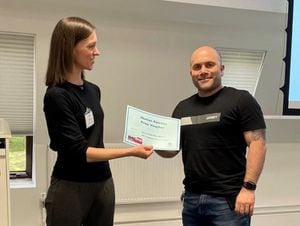Raising awareness of rare heart condition leads to award for New Cross Hospital staff member
A staff member at New Cross Hospital in Wolverhampton has won a national award for raising awareness of a rare heart condition.

Chris Scordis, a member of the cardiac rehabilitation team, was voted winner for best oral abstract at the British Association for Cardiovascular Prevention and Rehabilitation Exercise Professionals Group Conference.
At the event, which was live streamed internationally, Chris’s presentation raised awareness about Spontaneous Coronary Artery Dissection (SCAD).
SCAD occurs when a tear or a bruise develops in one of the coronary arteries, resulting in a blockage that prevents normal blood flow, which can cause a heart attack.
The cause of SCAD remains largely unknown and appears to be more common in young women lacking classic cardiovascular risk factors.
Chris, Specialist Exercise Physiologist and Lead for Cardiac Rehabilitation, had to submit a 250-word abstract on research and data collection being carried out by the Cardiac Rehabilitation team.
He was then selected to share a five-minute video presentation before answering questions from council members for a further five minutes.
The winners were announced at the association's annual conference and Chris was presented with a £50 voucher as his prize.
“The award is a nice accolade for the team and the Trust and it’s reassuring too,” said Chris, 45, who was born at New Cross Hospital and lives in Wednesfield.
Kay Sedgwick, Physiotherapy and Occupational Therapy Services Manager, added “It’s great that our cardiac rehab service is being recognised for the work that they are doing, particularly with patients with this rare diagnosis.”
Chris, who will shortly clock up his 21st year at the Trust, chose to look at the SCAD population with his team because the condition is topical and can be mis-diagnosed.
They examined the existing research, the demographics and history of patients, the first of which was diagnosed in 2015.
“Then we had a gap where referrals reduced until recent years, when they increased again,” said Chris. “We compared 20 patients (10 SCAD, 10 coronary heart disease) for age, ethnicity, comorbidities (where more than one disease or condition is present in a person at the same time, often chronic or long-term), and primary diagnosis.
“We then explored comorbidity connections, because it has been suggested that SCAD may be related to stress and mental health.
“We found every one of our patients had reported stress and mental health issues. Pregnancy is also associated with SCAD, but none of our patients had been recently pregnant, so we were able to rule that out.
“The other potential cause suggested in publications is an exertional event, but again, none of our patients had reported an exertional event.”
Chris believes there are two important messages people should be aware of concerning SCAD.
“From the patient’s point of view the message is that, because it typically younger females who are generally healthy, don’t ignore the symptoms – always seek the appropriate medical advice if you’re having chest pains,” he said.
“From a professional point of view, when a young female is in A&E with chest pains, don’t rule out the heart.
“A heart attack is often not considered as a diagnosis due to the absence of risk factors, including age. However, if the patient has had a heart attack due to SCAD it can be diagnosed through having a blood test and a coronary angiogram.”
Chris is joined in the Cardiac Rehab Service by the nursing team made up of seven nurses and his exercise team – two exercise physiologists and a physiotherapist.
Once a patient is discharged from the ward and referred by the nursing team to the exercise team, a member of Chris’s team calls them, reviews any reason why physical activity might be harmful and discusses their current activity levels.
Then they will be brought in for a face-to-face assessment to assess their physical ability, measure body composition and blood pressure before being offered eight to 12 weeks of exercise rehabilitation.





